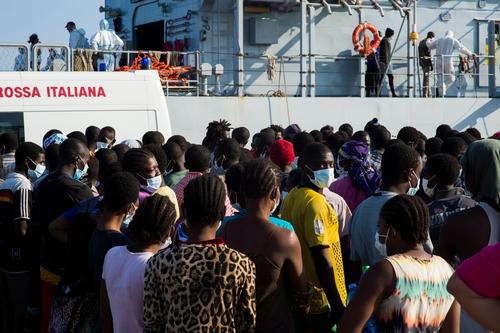
Today, thousands of people escaping violence are killed or die because of the color of their skin, their origins, and because there are too many of “them” to fit into the neoliberal order of exploitation and competition. At the same time, the disequilibrium of the climate originated in the global North and has had a devastating impact on the global South.
The European Union had no qualms when it defunded and thus forced the Mare Nostrum Italian program to be abandoned and then moved to the Frontex program, based on nationalist (here European) security and militarization. Mare Nostrum saved 150 000 people, while Frontex, not designed to save people, has already killed thousands with more deaths to come.
This move seemed innocuous from the United States where the militarization of civil society has already been normalized.
After the events of Baltimore, Stephanie Rawlings-Blake, the mayor of Baltimore, went on air to establish that, thanks to the police and the military, the city was back in order, adding that Baltimore was resilient. Resilience rhymes with silence, and, as Audre Lorde taught, “silence and invisibility go hand in hand with powerlessness”.
The indifference to the ordeal of millions in the Global South is a racial issue that is used to promote and allow an absurd, but for a few profitable, bio-economic order that needs racism to impose so-called free trade markets and their dehumanization through militaristic means. Organizations as respected as Amnesty International or Medecins Sans Frontières MSF (Doctors without Borders), whose President once opposed the Western military actions in Libya, present in their latest reports evidence of this racist indifference and its consequences for real human beings. Nicolas Sarkozy, former president of France, continues to defend his government’s decision to involve France in the bombing of Libya. At least, another French president refused to participate to the destruction of Iraq but that was then.
Amnesty interviewed refugees to document the reality of the very long journey to the Mediterranean Sea shores. Libya is often the destination. People risk abduction and extortion by smugglers and police. Women face the additional risk of sexual violence, and all in the context of growing racial and religious intolerance. The next goal is to escape Libya where the rights of allegiance to local powers prevail over human rights. With the complicity of many, the smugglers have developed a new crude business in this zone of no rights.
The smugglers are merely taking advantage of a situation that has it source somewhere else. As Loris De Filipi, MSF President explained, “A mass grave is being created in the Mediterranean Sea and European policies are responsible.” Both Amnesty and MSF are demanding a change of European policies.
The European Commission has proposed to create a quota system to distribute the migrant population among European countries according to their size and economy, “share the burden.” Thus far, only six countries out of the twenty-eight countries have agreed to participate to this program. British Home Secretary Theresa May has rejected participating in any EU migrant resettlement proposal. Her conservative counterparts in the EU have agreed with her. Instead, they have offered a military intervention to destroy the smuggling business in Libya.
The formula of “nothing for refugees and everything for the military” comes from a radically racialized world vision. The “refugee crisis” is is not a question of choice or opportunity, to use neoliberal language. People just want to escape the impossibility of life.
With about 19 000 km of walls built in the world, the message is violent and the violence it creates. We should instead look at opening the borders and learn about the racialization of humanity. Only by freeing the movement of people can the world start a desegregation process that is necessary if we want to survive. Every serious geographer agrees people thrive when they can move and not be fixed in place.
We have been told the markets should be free because they can regulate themselves. It’s not so. Having no real existence, markets, can never be free. Only the people can regulate, and only the people can know freedom.
(Photo Credit: MSF / Ikram N’gadi)
